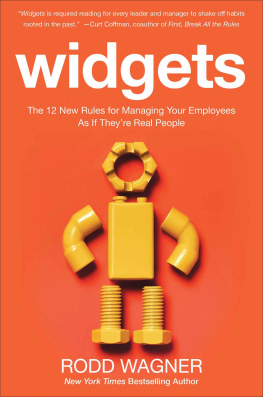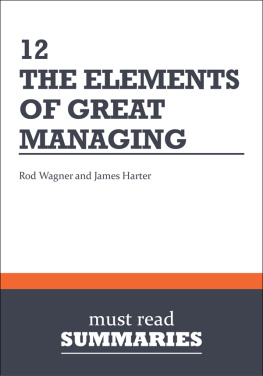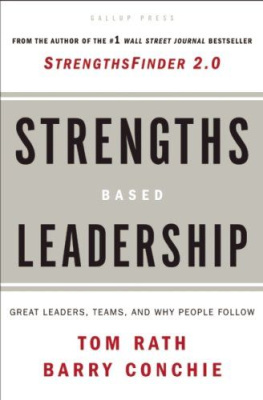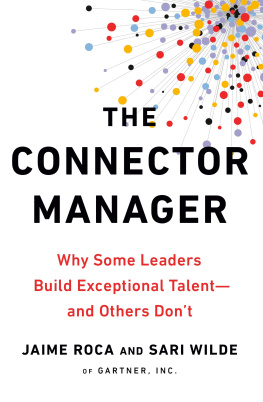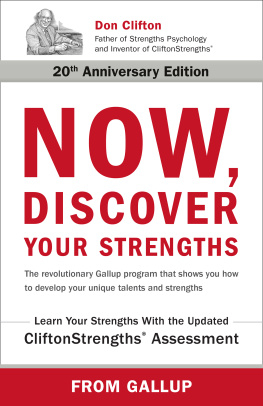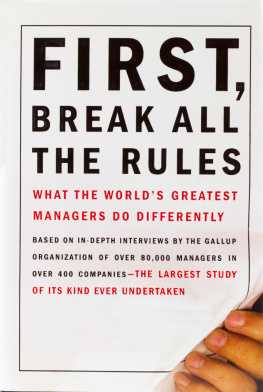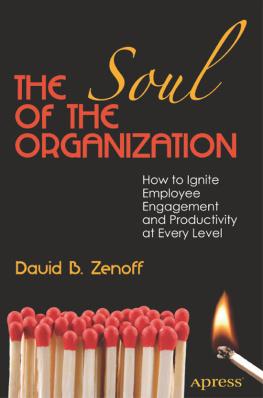Gallup Press
1251 Avenue of the Americas
23rd Floor
New York, NY 10020
Copyright 2006 Gallup, Inc., Washington, D.C.
All rights reserved, unless otherwise stated in the text, including the right of reproduction in whole or in part in any form.
Each of the Q12 statements represents millions of dollars of investment by Gallup researchers, and as such they are proprietary. They cannot be reprinted or reproduced in any manner without the written consent of Gallup, Inc. Copyright 1993-1998 Gallup, Inc., Washington, D.C. All rights reserved.
Gallup, Q12, StrengthsFinder, Clifton StrengthsFinder, and each of the 34 Clifton StrengthsFinder theme names are trademarks of Gallup, Inc., Washington, D.C. All other trademarks are the property of their respective owners.
First edition 2006
ISBN - 13: 978-1-59562-047-7
To my parents, Robert and Sherrie Wagner
- RGW
To RaLinda, Joey, and Sam
- JKH
I NTRODUCTION:
The Value of Employee Engagement
P EANUT WAS AN IMPROBABLE NICKNAME for the veteran union member who worked on the loading dock. Under the Big Dogs baseball hat and blue sweatshirt was an imposing man who bore a passing resemblance to onetime NBA power forward Karl Malone.
His manager, Lou, asked if he would agree to be interviewed for a study of what makes a good work life. Forget it, he said. He didnt really like the larger company, and he wasnt going to be part of any effort to sugarcoat things.
Theyre not going to ask you about the company, said his manager. Theyre going to ask about things right here. Theyre going to ask about me, about our team. Would you do it as a personal favor to me?
Thats different, Peanut relented. He had plenty of good things to say about his manager, his team, and work on the dock itself. And, he told his manager, For you, Ill do it.
After a few minutes of questions from the interviewer, Peanut loosened up and began talking effusively about Lou and the improvements hed brought to the facility. Once Peanut started talking about his supervisor, he just kept going.
Lou cares about everybodys situation, he said. He has an understanding. He can take control of a situation. Weve never seen the changes happen in our environment like theyre happening now. Youve got a guy who will look out for you. You call him with a problem; hell help you work through it.
Each time the interviewer asked a question, Peanut ran with it, telling stories about Lou listening to the ideas of the men on the dock, praising good work, marshaling or fine-tuning the right equipment, picking up someone whose broken car left him stranded, or giving advice about personal matters.
A good supervisor, the dockworker said, is not only a person who comes to work to hand out orders from the top but also somebody who will work with people. Not every situation is about authority and writing people up, punishment for things that you might have messed up. Its also about somebody who looks out for you, cares about whats going on, will show the concern to pull you up if youve got a problem, and will ask you, Is there anything I can help you with? You want those kinds of people in your corner. Weve seen quite a few people come and go. Lou is the best weve seen. He has made a difference a big difference.
As it turned out, Peanut had some sage insights into what makes a great manager, insights that match discoveries emerging from the worlds largest database of employee opinion and business performance. Those results show that in rallying the troops, front-line managers matter more than senior leaders. Hardworking supervisors who care can motivate even the most cynical employees. Great managers like Lou drive better bottom-line results not only while improving the lives of their employees, but precisely because they improve those lives.
Identifying the mechanisms through which employee engagement is increased and translated into profits required a tremendous amount of research. More than a decade ago, The Gallup Organization took a broad view of how companies were managing their people and determined that most organizations were shooting in the dark. The typical business commissioned an excruciatingly long survey of employee opinion, hoping that somewhere among 100 or 200 questions, it would stumble upon the concepts that mattered. When the results returned, they were too cumbersome to feed back to the troops, where no one would have known what to do with them anyway. Executives assumed there was a general level of satisfaction that pretty much applied throughout the company, and that they the senior team were the main drivers of their employees feelings about the company. All these assumptions were wrong.
Gallup assembled a select group of its social scientists to examine the 1 million employee interviews then in its database, the hundreds of questions that had been asked over the preceding decades, and every variable on business-unit performance that organizations had supplied with their employee rosters. These data were analyzed to find which survey questions and therefore which aspects of work were most powerful in explaining workers productive motivations on the job. Ultimately, 12 elements of work life emerged as the core of the unwritten social contract between employee and employer. Through their answers to the dozen most important questions and their daily actions that affected performance, the million workers were saying, If you do these things for us, we will do what the company needs of us.
The 12 Elements of Great Managing that emerged from the research are as follows.
1. I know what is expected of me at work.
2. I have the materials and equipment I need to do my work right.
3. At work, I have the opportunity to do what I do best every day.
4. In the last seven days, I have received recognition or praise for doing good work.
5. My supervisor, or someone at work, seems to care about me as a person.
6. There is someone at work who encourages my development.
7. At work, my opinions seem to count.
8. The mission or purpose of my company makes me feel my job is important.
9. My associates or fellow employees are committed to doing quality work.
10. I have a best friend at work.
11. In the last six months, someone at work has talked to me about my progress.
12. This last year, I have had opportunities at work to learn and grow.
Behind each of these is a fundamental truth about human nature on the job. The correlations between each element and better performance not only draw a roadmap to superior managing; they also reveal fascinating insights into how the human mind molded by thousands of years of foraging, hunting, and cooperating within a close-knit and stable tribe reacts in a relatively new, artificial world of cubicles, project timelines, corporate ambiguity, and constantly changing workgroup membership. People neither were created to fit corporate strategies nor have evolved to do so. Rather than contest these facts, the most successful managers harness the drive, virtuosity, and spirit that come with employing humans, even as they understand the inevitable chinks in their armor.
The 12 crucial statements were disseminated widely in the best-selling First, Break All the Rules , published in 1999. Much of its success stemmed from challenging the prevailing ideas in ways that helped executives better understand what Peanut already knew, such as why he would do things for Lou that he wouldnt do even for the companys chief executive. Leaders on snorting steeds... are important. But great managers are the bedrock of great organizations, Tom Peters wrote in touting the discoveries. Great managers are an organizations glue.
Many executives struggle to formulate a strategy for increasing profits through their employees. Often they resort to the simple arithmetic of fewer employees = lower costs, without considering the wide range in productivity that depends on each persons engagement. I dont think enough investors have asked the more important question: Can companies be even more successful by focusing on optimizing each employees contribution, rather than simply looking for ways to reduce the cost of employing them? wrote a columnist for The Wall Street Journal. Perhaps we, as investors, need to be more conscious of how those people who clean our hotel rooms, cook our meals, and deal our cards are treated and paid, rather than simply looking to see whether the expense can be cut further. Staff motivation, although difficult to quantify, should be part of the investment analysis.
Next page

